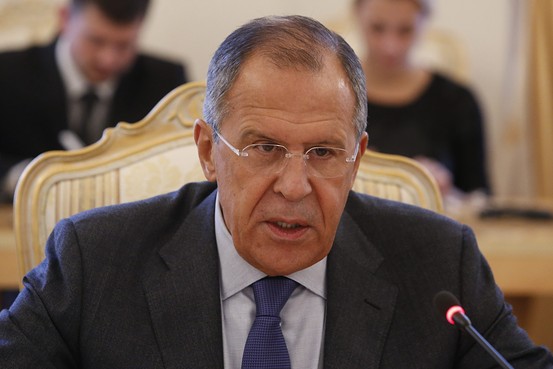
Paul Sonne
.
Foreign Minister Sergei Lavrov Says U.S. Needed to Moderate 'Party of War' in Kiev
MOSCOW—Russia called on the U.S. to push Kiev into giving up its military campaign against pro-Russia rebels in eastern Ukraine and negotiating a political deal, as recent Ukrainian gains on the battlefield were reversed by what Western officials called an influx of Russian men and materiel.
Foreign Minister Sergei Lavrov said Washington should pressure Ukrainian President Petro Poroshenko to reach a deal during his planned visit to the U.S. later this month.
"It is imperative to moderate the 'party of war' in Kiev, and the only one who can really do that is the U.S.," Mr. Lavrov said at a briefing Tuesday, according to the Interfax news agency. "It is very important the U.S. uses its influence and capabilities to give the signals necessary to transition to the political process from attempts to solve the situation by force."
For months, Ukrainian forces had been gaining ground in Donetsk and Luhansk, the two rebellious regions along the Russian border. But late last month the rebels emerged with fresh reinforcements and weaponry that Western and Ukrainian officials said came directly from Russia. That has changed the battlefield dramatically, sending Ukrainian forces into retreat.
At the same time, Russian officials including President Vladimir Putin and Mr. Lavrov have stepped up demands that Ukraine negotiate a political truce with the rebel leaders, putting pressure on an increasingly weak-looking Kiev government.
Though Kiev has offered to give more authority to the regions, Ukrainian officials largely view the rebel militants as Russian proxies. Ukraine dismisses the idea of formalizing what it warns could become a destabilizing Russian vassal state within its borders, able to scuttle any national initiatives deemed contrary to Kremlin interests.
Russia has denied accusations that its troops entered Ukraine to prop up the rebels, despite the recent capture of Russian soldiers on Ukrainian territory and an assessment by the North Atlantic Treaty Organization that Russia has "well over" 1,000 troops operating in Ukraine. Separatist leader Alexander Zakharchenko has said Russian soldiers have been fighting in the rebel ranks while on vacation. (Follow the latest updates on the crisis in Ukraine.)
In a phone call last week, Mr. Putin told European Commission President José Manuel Barroso that he could take Kiev in two weeks, should Russia want to invade Ukraine, according to an European Union official briefed on the discussion.
Kremlin foreign policy aide Yuri Ushakov told Russian news agencies Tuesday that Mr. Putin's words were taken out of context. He criticized the disclosure of a private telephone conversation as a breach of diplomatic protocol.
Meanwhile, Russia has amplified its calls for more autonomy for Donetsk and Luhansk. In a state-television interview aired Sunday, Mr. Putin said Kiev must engage in talks "on questions of the political organization of society and statehood in Ukraine's southeast." His spokesman, Dmitry Peskov, later clarified that the battle-torn Donetsk and Luhansk regions should stay part of Ukraine, but could gain more independence.
Talks so far have yielded little. The two sides held negotiations on a cease-fire Monday and may meet again in the next few days.
Ukrainian Foreign Minister Pavlo Klimkin said Tuesday that the talks would continue and that so far they had focused on a range of questions, including conditions for the implementation of a bilateral cease-fire. He said the main issue is whether the rebel leaders will work constructively.
"For that to happen, this requires corresponding political will and corresponding instructions from Moscow, because we know they are fully controlled from the Russian capital," Mr. Klimkin said.
After a rebel-organized referendum on independence from Ukraine in May, separatist leaders in Donetsk requested that Russia annex the region, but their plea was met with silence by the Kremlin.
Ukraine and the West condemned the referendum, which came two months after a similar vote in Ukraine's Crimea region, which Russia then quickly annexed.
Rebel leaders said the results in Donetsk and Luhansk indicated an overwhelming desire by locals for independence. Participants weren't asked whether they wanted to be part of Russia.
Last week, Mr. Lavrov said Russia supports "the practical implementation of the results of the referendum," through negotiations between Kiev and representatives of Ukraine's east. "We are convinced that the possibility to negotiate with all Ukrainian regions is far from exhausted," he said.
Rebel leaders have denounced the idea of remaining part of Ukraine. "We definitely don't see ourselves as being a subject of Ukraine," Andrei Purgin, a rebel leader participating in the talks, told Interfax. "All other possibilities can be considered and discussed."
The conflict in Ukraine has caused the deepest divide between Russia and the U.S. since the days of the Cold War. PresidentBarack Obama will visit Estonia this week on his way to a NATO summit in Wales, as a show of support for the former-Soviet Baltic states, which view Russia's actions in Ukraine as a threat.
NATO has announced plans to boost its presence in Eastern Europe to afford greater protection to alliance members, which include the Baltic states and Poland.
Russia is already preparing changes to its military doctrine in response to NATO and the situation in Ukraine, the Deputy Secretary of Russia's Security Council said in an interview Tuesday with the state news agency RIA Novosti. Mikhail Popov said NATO's moves to encroach upon Russia would remain one of the country's primary external threats. He said NATO repeatedly promised good intentions toward Russia, but the bloc's actions in recent years "showed a completely different story."
The military doctrine Russia passed in 2010 designated NATO as a threat by name, contrary to the previous version. "In 2010, that part of the military doctrine caused a severe reaction from the U.S. and NATO," Mr. Popov said. "An array of top officials accused the leaders of our country of retrograde thinking and said NATO wasn't an enemy of Russia and would never attack Russia. But is that so?"



_jpg/250px-ElbeDay1945_(NARA_ww2-121).jpg)





